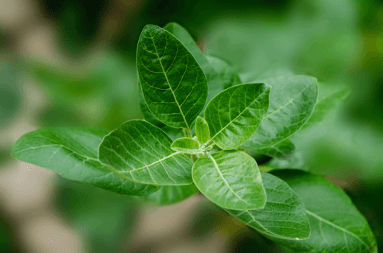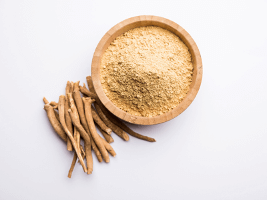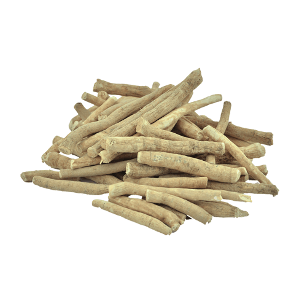Talking about medicinal shrubs that are good for managing or adjusting to stress, there is no doubt Ashwagandha is one of the most potent and effective herbs you can use. Additionally, its usefulness goes beyond just managing stress; it can also improve your healthy lifestyle, especially if you are a woman who goes through a lot of stress that results in mood swings, hormonal imbalance, anxiety, and irregularities in your menstrual cycle. However, did you know there are some side effects of using this herb as a woman? Read on to learn the side effects and how to use Ashwagandha effectively.
The Potency of Ashwagandha

Ashwagandha, also known as Withania somnifera, is a medicinal plant with nervine and adaptogen properties. This herb has been one of the most potent Ayurvedic products for thousands of years¹, and it is most popular with Indians, Africans, and people from the Middle East. Ashwagandha is also known as “Indian winter cherry,” “Indian ginseng,” and “Amukkara.” In addition, you can get it in the form of capsules, gummies, herb tea, and powder form: these forms are also concentrated with the chemical ingredients you get from its roots and berries.
Though this ancient impressive plant has many health benefits, such as managing stress and improving body systems, it has no standard clinical dosage. Therefore, you must consult your healthcare provider or doctor to determine if this herb is appropriate for your health condition.
The Side Effects Of Ashwagandha on Women
Ashwagandha has many health benefits for improving women’s body systems. However, it contains immunomodulatory and hypoglycemic properties that can trigger adverse effects in some women. Therefore, knowing its side effects is significant for every woman.
Pregnancy Abortion

Ashwagandha is one of the abortifacients you should avoid during pregnancy.² This herb can endanger or terminate the life of a fetus in the womb, leading to miscarriage. Similarly, it has been established through casual observation that Ashwagandha can cause early menstruation. At the same time, some researchers believe it is only harmful to the pregnancy when you take it in large quantities. Though there is only a little evidence to corroborate this notion, it is better to avoid Ashwagandha during pregnancy.
Besides, the Food and Drug Administration (FDA) has not cleared the use of Ashwagandha for pregnant women. Likewise, it is not advisable to use it to abort unwanted pregnancies because it can engender your life. Consult your healthcare provider or doctor to know what herb or medication works best for you during and after pregnancy.
Hemorrhagic Diathesis
Ashwagandha can cause hemorrhagic diathesis,³ a bleeding disorder that is rare among some women. This condition may occur when women take an overdose of Ashwagandha during their menstrual cycle. In other words, Ashwagandha can trigger heavy bleeding or excessive bleeding during ladies’ moments. Though this notion is based on casual observation, you should avoid using this herbal supplement if you have menses or bleeding disorders.
Talk to your doctor or healthcare provider to prescribe the right drugs for you during your month.
Worsen Low Blood Sugar Level

In contrast to causing excess bleeding disorders during menstrual periods, Ashwagandha can also cause low blood sugar levels which may result in severe issues for women with diabetes. Ashwagandha can lower your glucose level to the extreme and worsen your condition, especially if you are on diabetic or Hypoglycemia⁴ medications.
To avoid Ashwagandha’s negative effects, the American Diabetes Association (ADA) has instructed people with low sugar levels to avoid taking Ashwagandha as part of their medications because it can cause health conditions like seizures, dizziness, coma, and sudden death.
Talk to your professional medical practitioner to know if taking this herb will not adversely affect you.
Liver Injuries
Some researchers in 2020 discovered that taking excess Ashwagandha can also damage human beings’ livers. They confirmed this report from the final experiment carried out on five adults who used Ashwagandha, ranging from 450mg to 1350mg doses. They experienced hepatotoxicity from the herbs during the investigation, but it never led to liver failure.
In addition and to corroborate the previous studies, some other experimenters confirmed that the bioactive properties of Ashwagandha (Winthanone) may damage the DNA in the cells and cause liver injuries.
(This was according to the research carried out in the DNA of rats, but it hasn’t been proven in human beings.)
Increased Hyperthyroidism
Your body can naturally increase thyroid hormones on its own. However, using Ashwagandha can raise the level of thyroid hormones excessively. Therefore, it is not advisable for patients diagnosed with hyperthyroidism to use Ashwagandha. Hence, it may cause an abundance of thyroid hormone concentrations (thyrotoxicosis)
5
in the serum and lead to heart failure.
In addition, avoid taking Ashwagandha with Hashimoto’s thyroiditis or hypothyroid hormone drugs because it can cause severe problems for your body. Instead, consult your doctor or healthcare provider for a better prescription of drugs.
Triggers Ulcer and Gastrointestinal
Ashwagandha can irritate your gastrointestinal tract6 and trigger conditions like diarrhea, stomach upset, constipation, nausea, and ulcers if it is taken in large amounts. The chemical properties in Ashwagandha are responsible for this. So, avoiding the herb if you are diagnosed with any of these health issues is advisable.
However, the symptoms may stop some weeks after you stop using Ashwagandha, but avoiding this herb if you are diagnosed with an ulcer is the best decision. Also, ensure you talk to your healthcare provider about the right medications.
Auto-immune disorders

Ashwagandha is known to boost the immune system but it can also cause health issues if you are diagnosed with auto-immune disorders. Auto-immune disorders are conditions that occur when your body is attacked by your immune system and left unguarded against germs, viruses, and bacteria. The best way to treat this disorder is to contact your licensed healthcare provider, hence, using Ashwagandha can cause more severe complications like the formation of plaque psoriasis in the body.
Daytime Somnolence
Ashwagandha can make you drowsy if you abuse it. Even though one of its benefits is improving sleep quality at night, it can cause memory loss if it is appropriate for your system. Somnolence is the extreme state of drowsiness, which is abnormal. Avoid taking Ashwagandha early in the morning or during the daytime because it can lead to somnolence. Also, know that taking or abusing Ashwagandha may prevent you from being active and vibrant during the day. In addition, it can affect your organs, sleeping patterns, mood, and social lifestyle.
Likewise, do not use it with other sedative drugs or supplements to not experience severe health conditions. Finally, talk to your doctor if you are experiencing sleeping disorders. We don’t advise self-medication.
Benefits of Ashwagandha for Women

Though its side effects can be scary, Ashwagandha has some health benefits for both men and women.
7
Read
more here
to learn more about the benefits of Ashwagandha for women.
1. Healing of women’s orgasm and sexual disorders
2. Relieving and managing stress
3. Improving the body’s systems
4. Preventing cancer and Covid-19
5. Reducing inflammation
6. Immunity booster
7. Improving blood circulation
8. Increasing thyroid hormone
9. Treating skin conditions
10. Curing diabetes, arthritis, and epilepsy
11. Prevent the loss of brain function
12. Reducing anxiety and depression
13. Helping people with insomnia sleep
14. Increasing strength, endurance, and energy
15. Lowering cholesterol and triglyceride levels
16. Lowering blood pressure
17. Reducing blood sugar levels in people with diabetes
18. Reducing weight gain
How to use Ashwagandha
Using Ashwagandha is relatively easy because it is available in roots, herbs, liquid, powder, gummy, and capsule forms. You can also mix Ashwagandha powder with food or other supplements (as your doctor prescribes). However, you should avoid taking it in large quantities because there is no conventional clinical measurement for its dosage. Some researchers opine that 250mg to 600mg is okay for the body per day to cure any health issue, while others have different opinions that 1,000mg to 6,000mg of Ashwagandha powder and 500mg to 1500mg of root extract is the correct quantity.
8
You should talk to your doctor or professional healthcare provider before you use Ashwagandha. Don’t do self-medication!
Final Takeaway
Ashwagandha is one of the most potent herbal supplements with many health benefits, but it has yet to be regulated by the FDA. Though its usefulness can not be overlooked or denied, you should not ignore the side effects of this hyperactive ancient herb. There are records of severe complications and health issues due to self-treatment and experiments with Ashwagandha. These health conditions stopped after the patients discontinued taking the herb, though.
Finally, the standard measurement of Ashwagandha’s quantity to treat health conditions still needs to be discovered. Most people only use it based on discretion or what others did. This is quite dangerous for you if you are pregnant, diagnosed with diabetes or ulcers, hyperthyroidism, and hypertension. Ensure you discuss your conditions with a licensed physician to know if Ashwagandha is appropriate for your health.
References
1. An Overview on Ashwagandha: A Rasayana (Rejuvenator) of Ayurveda https://www.ncbi.nlm.nih.gov/pmc/articles/PMC3252722/
2. Pregnancy and Botanical Medicine Use and Safety, Aviva Romm https://www.sciencedirect.com/topics/pharmacology-toxicology-and-pharmaceutical-science/abortive-agent
Efficacy and Safety of Ashwagandha (Withania somnifera) Root Extract in Improving Sexual Function in Women: A Pilot Study, Swati Dongre, https://www.ncbi.nlm.nih.gov/pmc/articles/PMC4609357/
3. Testing for VHFs Viral Hemorrhagic Fevers A-Z https://www.cdc.gov/vhf/index.html
4. 10 Warning Signs of Low Blood Sugar https://www.everydayhealth.com/type-2-diabetes/symptoms/signs-of-low-blood-sugar/
5. Ashwagandha as a Unique Cause of Thyrotoxicosis Presenting With Supraventricular Tachycardia https://www.ncbi.nlm.nih.gov/pmc/articles/PMC9035336/
6. Ashwagandha – LiverTox https://www.ncbi.nlm.nih.gov/books/NBK548536/
7. Supplements Ashwagandha – Uses, Side Effects, and More https://www.webmd.com/vitamins/ai/ingredientmono-953/ashwagandha
8. How to Use Ashwagandha: 7 Steps (with Pictures) https://www.wikihow.com/Use-Ashwagandha

 By Nancy H, PharmD
By Nancy H, PharmD
 Updated: September 3, 2024
Updated: September 3, 2024
 7 minutes
7 minutes

















